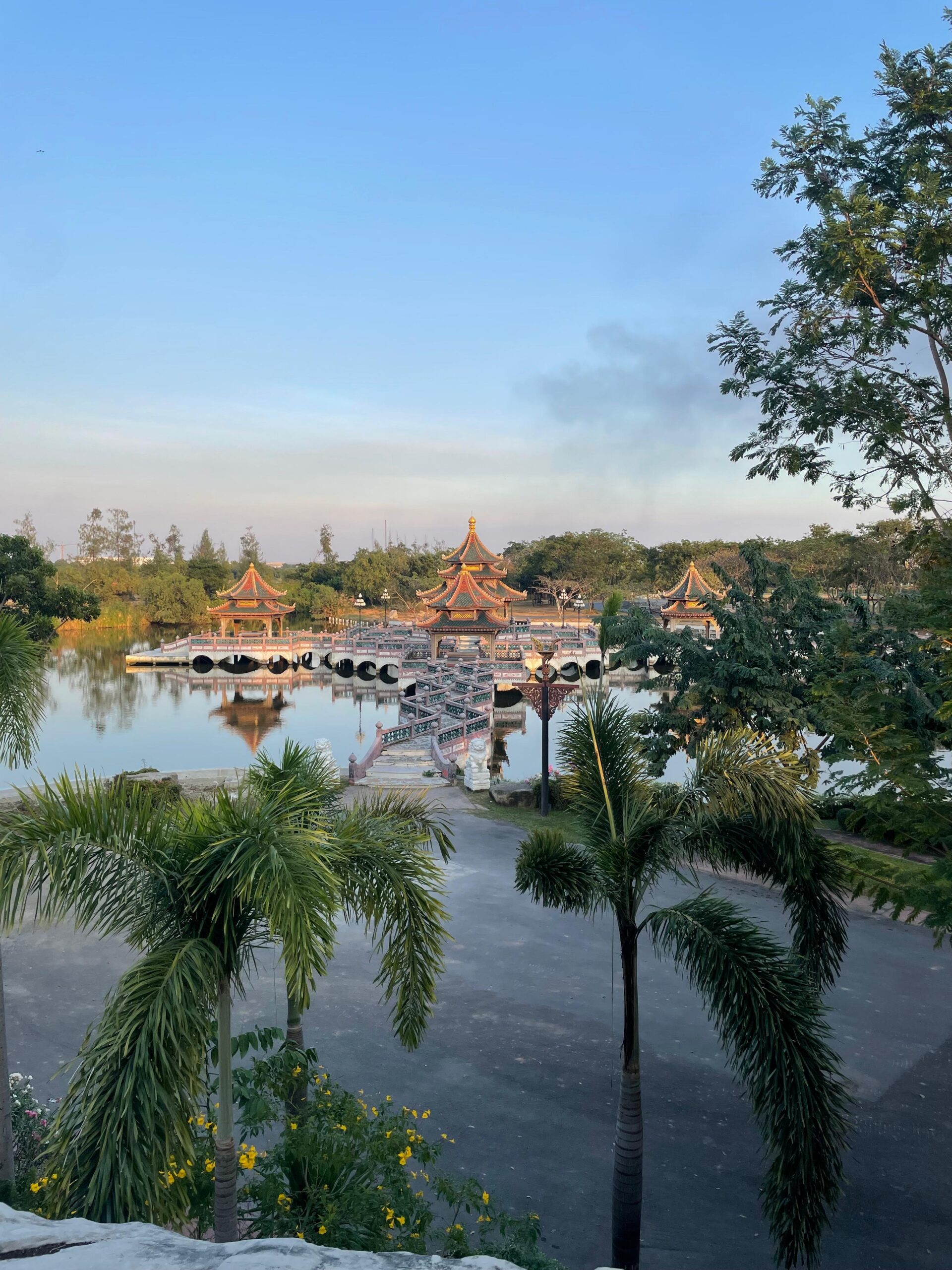Thailand is probably one of the most popular places to visit for tourists but even more so for digital nomads. Therefore, it’s good news that they finally launched the digital nomad visa Thailand.
By introducing this new digital nomad visa, which is also known as Destination Thailand Visa (DTV), the Thai government responds to the growing interests of digital nomads to spend more time in the country.
Up till now, most nomads had to fall back on the more traditional visa options which were not always a good fit. If you want to check these other options out, you can have a look at my article about all visa options for Thailand.
In this article, I’ll discuss all the important things you need to know about the Thai digital nomad visa.
Destination Thailand Visa Facts
- Minimum income requirement: no minimum income requirement but you need a bank balance of at least THB 500.000 (~€13.500)
- Other requirements: work remotely, be at least 20 years old and gather the necessary documents
- Application process: most important element of the application process is that you need to apply from outside of Thailand
- Validity: valid for 5 years for 180 days per year and you can enter multiple times
- Extension: extension is possible which grants you another 180 days

Eligibility Criteria for the Thailand DTV Visa
If you want to apply for the Destination Thailand Visa, you need to meet some requirements.
Just like with most other digital nomad visas, you’ll of course need to work remotely.
Furthermore, the most important criteria is probably the minimum income / wealth you need to have. Below, we’ll dive deeper in the different requirements.
Work Remotely from Thailand
Probably the most obvious criteria is that you should work remotely.
You’ll also have to provide proof of your ability to work remotely.
If you work as an employee, it’s rather straightforward. You can provide a copy of your employment contract which mentions that you can work remotely. Another option is to get a declaration from your employer which confirms you can work online. Either document needs to be authenticated by the embassy in the country where the company is located.
As a freelancer, you’ll need to provide proof of your company registration or business license. These documents also need to be authenticated by the competent embassy. On top of this, you need to provide a professional portfolio of the work you do.
Sufficient Funds to Apply for DTV
Another requirement we see with most digital nomad visas is the requirement of having sufficient income or means to sustain yourself during your stay.
For the digital nomad visa Thailand this means you need to have a bank balance of at least 500.000 Thai Baht (~€13.500) during the three months prior to your application.
Furthermore, you need to add proof of salary / income for the last six months before your application. Yet, the visa doesn’t have a real minimum income threshold.
Age Restriction for Thailand Nomad Visa
Thailand restricts the application for the destination Thailand visa to people who are 20 years or older.
Digital nomad visa Thailand: Other Requirements and Documents
Furthermore, you’ll need to collect the necessary documents for your application. These include:
- Criminal record
- Completed visa application forms
- Two passport pictures
- Proof of remote work (cfr. supra)
- Proof of sufficient funds (cfr. supra)
Note that documents should be provided in English or Thai. If this isn’t the case, they should be translated by an official translator.
DTV Application Process
You need to get through different steps in the application process for the digital nomad visa Thailand.
Check Eligibility Criteria of the Digital Nomad Visa Thailand
The first step in the application process is to make sure you meet the eligibility criteria which we discussed before (cfr. supra).
Gather Documents
Once you figured out you meet these requirements, you need to gather all the documents showing you meet the requirements and some others. Hereby an overview:
- Criminal record
- Completed visa application forms
- Two passport pictures
- Proof of remote work (cfr. supra)
- Proof of sufficient funds (cfr. supra)
- If you want to include dependents in your application you need to provide proof of your relationship with them (e.g. marriage or birth certificate)
Note that documents should be provided in English or Thai. If this isn’t the case, they should be translated by a certified translator.
Submit Application
There are two ways to submit your application.
The first option is to go to your local Thai embassy or consulate to hand in your application on paper.
The second option is to use the official Thai e-Visa Portal from the comfort of your home.
Whichever way you decide to submit your application, it will in any case be managed by the local Thai embassy of your place of residency. They also have the authority to ask for any additional documents they deem necessary.
When you submit your application for the digital nomad visa Thailand, you’ll also have to pay the application fee. The fee will depend from which country you’ll apply from but ranges between 10.000-15.000 Thai Baht (~€270-400).
Wait for Approval and Collect Your Digital Nomad Visa Thailand
Once you submitted your application and paid the visa fee, you just need to sit back and wait. How long the review of your application takes, will depend on the workload of the local embassy.
After you receive confirmation your digital nomad visa Thailand was approved, you need to pick up your visa from the local embassy or consulate within 60 days.
So, although you can submit your application (online) from anywhere in the world, you’ll have to pick up the visa in your country of residence. Hence, this is a big inconvenience for most digital nomads. Nevertheless, I have heard stories of people who were able to apply in another (Asian) country without being a resident there. Yet, success can’t be guaranteed.
You can always check other visa options for Thailand if your application wasn’t approved.
Extend Your Thailand DTV Visa
The Thai digital nomad visa will allow you to stay in Thailand for 180 days per year. Furthermore, the visa is valid for 5 years and you can enter the country multiple time on your visa. So, it’s not necessary, to use your 180 days in one visit.
If 180 days is still not enough for you, you can also extend your visa to get another 180 days. Luckily, you can get this extension from the immigration office in Thailand. So, here there is no need to apply for the extension from outside of Thailand. With the extension you can stay in Thailand almost year round.
Tax Consideration Before Applying for the Digital Nomad Visa Thailand
If you plan to apply for the the Thai digital nomad visa, you also want to make sure you understand the possible tax consequences of this.
In Thailand, you become a tax resident if you spend 180 days or more in the country during the calendar year.
So, if you use the full amount of 180 days you get on your Thai DTV, you’ll qualify as a tax resident of Thailand. If you stay less, you’ll be able to avoid tax residency in Thailand. Therefore, this is an important element to take into account.
Nevertheless, becoming a tax resident of Thailand isn’t necessarily a bad thing. You’ll only pay tax on the income you bring back into Thailand. You can read more about the details and exact rules in my article on tax residency in Thailand.

How is Thailand for Digital Nomads?
Even before introducing the digital nomad visa, Thailand was a hotspot for digital nomads.
There are various reasons why nomads like Thailand:
- Cost of living: with rising living costs all over the world, more and more people are looking for an affordable place to stay. Thailand definitely still has rather low cost of living which makes it affordable for many digital nomads.
- Good internet: as digital nomads we heavily rely on a good internet connection to get our work done. In Thailand you’ll be able to find high speed internet all over the country. However, if you plan to travel through the jungle, this might of course be another story.
- Culture: many nomads also go to Thailand for a cultural experience. The country is home to many magnificent temples which were build ages ago. While others visit the country for the great food or to take Muay Thai classes.
- Community: for all of the reasons mentioned before – and many more – you’ll find many digital nomads in Thailand. This on its turn has a positive impact on the digital nomad community which in itself is another element why many nomads like Thailand so much.
With the introduction, you’ll finally have the option to stay long term in Thailand without the need to worry about your visa situation.
Yet, you do want to make sure that you understand the tax consequences of spending a lot of time in the country as this could trigger tax residency in Thailand.
Work With Me
Do you want to figure out what tax consequences applying for a digital nomad visa might have? Or do you need assistance with your whole tax setup?
Then reach out to me and together we’ll create a plan to legally minimize your tax burden!
